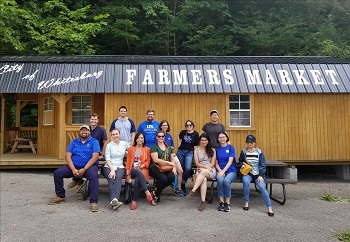Superfund Research Program
August 2021
NIEHS Superfund Research Program (SRP) trainees from institutions across the Southeastern U.S. gathered virtually for a two-day event, Aug. 2 and 4, to discuss best practices for partnering with communities vulnerable to environmental exposures. The event was organized by the University of North Carolina at Chapel Hill (UNC), North Carolina State University, Duke University, University of Kentucky (UK), University of Louisville, and University of Alabama at Birmingham SRP centers.
As part of a panel of community organizers, Belinda Joyner from Clean Water for North Carolina and Keshi Satterwhite from the Ellerbe Creek Watershed Association discussed how their collaborations with SRP centers provide communities with the tools needed to inform positive change around environmental health issues.
Trainees learned to involve communities early in the research process, during the planning stages, to understand their needs and concerns. Presenters also encouraged trainees to develop their communication and translation skills, which are important tools to apply research in context.
“Build on the resources communities already have and strengthen those,” said UK SRP Center Community Engagement Core program manager, Annie Koempel, Ph.D. “This can often facilitate the research process.”
Panelists described how communities in North Carolina, Kentucky, and other states experience similar threats to public and environmental health, and how solving these issues requires collaborative thinking and interdisciplinary perspectives.
“When you put together teams of researchers and community leaders with different backgrounds and expertise, you can get more things done,” said Joyner.

Researchers from the University of Kentucky work in rural Appalachia to improve diet by providing wellness and nutrition information and giving locals money to shop at the farmers market.
(Photo courtesy of the University of Kentucky Superfund Research Program)
Other presenters from the event included University of Louisville, UK, and Duke SRP center researchers who shared lessons learned over decades engaging with diverse communities.
“Every community I have ever worked with is very different,” said Luz Huntington Moskos, Ph.D., from the University of Louisville SRP Center. “I have learned that before you engage in new collaborations, it is important to step back and think about what is the best way to communicate your message to new groups.”
The event also featured former SRP trainees who have moved on to apply their interdisciplinary training at other federal agencies. Nika Larien, Ph.D., explained how her training at the UK SRP Center paved the way for translating her research beyond the laboratory. Larien is now a science and technology policy fellow at the Center for Nutrition in the U.S. Agency for International Development.
Brad Newsome, Ph.D., explained that his current work with low-income communities around the world was informed by his trainee experience with the UK SRP Center in rural Appalachia. He now works as a program administrator at NIH.
During breakout sessions, 12 trainees presented 3-minute elevator pitches to community partners, SRP researchers, and trainees from other institutions. This allowed trainees to receive feedback on the clarity and appropriateness of their presentations. Trainees used pictures and analogies to present complicated scientific topics to the communities they partner with.
“This event shed light on the commonalities across SRP centers,” said Lauren Heberle, Ph.D., from the University of Louisville SRP Center. “Opportunities that allow trainees to interact across centers will spark creative thinking and future collaborations."

